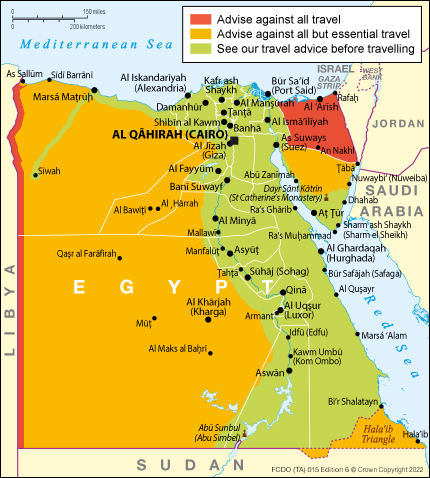Egypt
Summary

The Foreign, Commonwealth & Development Office (FCDO) advises against all travel to:
- the Governorate of North Sinai
- within 20km of the Egyptian and Libyan border. This excludes the town of El Salloum (where we continue to advise against all but essential travel).
The FCDO advises against all but essential travel to:
-
the northern part of the Governorate of South Sinai beyond the St Catherine-Nuweibaa road. This excludes the coastal areas on the western part of the peninsula between the Suez crossing and the southern part of the Governorate of South Sinai.
-
the area west of the Nile Valley and Nile Delta regions. This excludes the Governorate of Faiyum, and coastal areas between the Nile Delta and Marsa Matruh, the Marsa Matruh-Siwa Road, and the oasis town of Siwa.
-
the Hala’ib Triangle
-
the Bir Tawil Trapezoid
Before you travel, check the ‘Entry requirements’ section for Egypt’s current entry restrictions and requirements. These may change with little warning. Monitor this advice for the latest updates and stay in contact with your travel provider.
If you plan to pass through another country to return to the UK, check the travel advice for the country you’re transiting.
It is more important than ever to get travel insurance and check it provides sufficient cover. See the FCDO’s guidance on foreign travel insurance.
An estimated 476,000 British nationals visited Egypt in 2019. Most visits are trouble free.
Terrorists are very likely to try to carry out attacks in Egypt. There is considered to be a heightened threat of terrorist attack globally against UK interests and British nationals, from groups or individuals motivated by the conflict in Iraq and Syria.
Although most attacks occur in North Sinai, there is a risk of terrorist attacks across the country. Attacks could be indiscriminate, affecting Egyptian security forces, religious sites, large public gatherings and places visited by foreigners. There is a heightened threat of terrorist attacks in or around religious sites and during religious festivals, such as the month of Ramadan and the Christmas period (including Coptic Christmas), when terrorist groups have sometimes called for attacks. Terrorist attacks have occurred over local holiday weekends. Terrorists have attacked tourists in Egypt in the past. There is a heightened threat of terrorist attacks targeting Coptic Christians from extremists linked to Daesh-Sinai in Egypt.
You should follow the advice of Egyptian authorities, remaining particularly vigilant and maintaining a high level of security awareness in crowded places and at large gatherings. You can find a list of public holidays on the Egyptian Presidency website. The authorities in Egypt maintain a significant security presence across the country, including armed security officers stationed at important sites, critical infrastructure, and road checkpoints. Extra measures are in place at tourist sites. See Terrorism
Following the crash of a St Petersburg-bound flight in North Sinai in October 2015, direct flights between the UK and Sharm el Sheikh were suspended. The UK government has worked with Egyptian authorities to enable flights to resume, and on 22 October 2019 the restrictions were lifted. You should check with your airline or tour operator for information on services.
There remains a heightened risk of terrorism against aviation in Egypt. Additional security measures are in place for flights departing from Egypt to the UK. You should co-operate fully with security officials at airports. See Terrorism and Air travel
COP27 Summit
Egypt will host the UNFCCC’s COP27 Summit in Sharm El Sheikh from 6-18 November 2022. If you are travelling to attend COP27 you should sign up for email alerts to the Egypt Travel Advice page, so that you can stay up to date on the latest developments. Further information about planning your trip is available at the official COP27 website. If you plan on participating in the COP Summit please ensure you have correct documentation, including accreditation and visas.
In the lead-up to and during the summit you can expect road closures, limited availability of transport, an increased security presence, and limited availability of accommodation in Sharm el Sheikh.
Pre-planned and authorised demonstrations are likely to take place, including at a designated protest zone outside the summit area. Spontaneous demonstrations may also take place both within and outside the summit area. Foreigners engaging in any form of political activity or activities critical of the government may be at risk of detention or other measures.
Before travelling you should familiarise yourself with the entry requirements for Egypt. Ensure you have appropriate travel insurance, and follow the latest COVID-19 requirements. See health for more information, including what to do if you need to bring prescription or over-the-counter medication into Egypt.
While in Egypt, you must abide by local laws. Egyptian laws and customs are different to those in the UK. See local laws and customs for more information.
For further detail about what the FCDO can do to support British nationals abroad, see this guide.
British passport holders travelling to Egypt normally need a visa. See Visas
To contact the emergency services call 122 (police), 123 (ambulance) or 180 (fire).
If you’re abroad and you need emergency help from the UK government, contact the nearest British embassy, consulate or high commission. Consular support is severely limited in parts of Egypt where we advise against all travel and limited where we advise against all but essential travel.